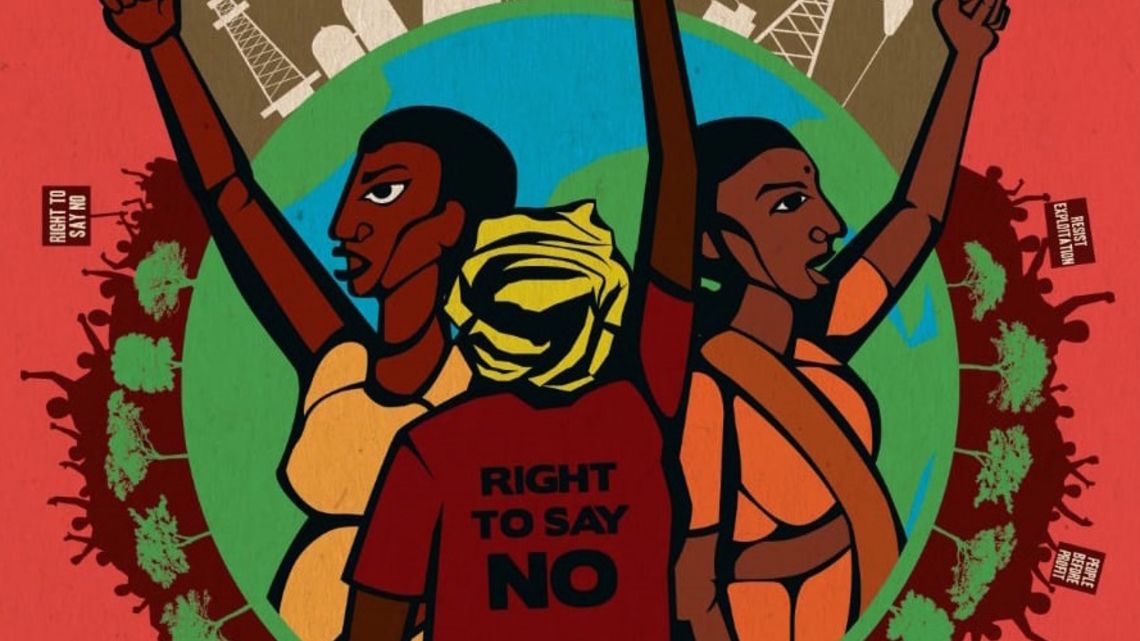The Forum
From the 12th to the 15th November 2018 c. 300 participants from over 60 countries across the world met in Johannesburg for the Thematic Social Forum on Mining and Extractivism. The organising committee consisted of several of BfdW’s partners in South Africa, including TCOE, AIDC and WoMin .
Inspired by the form of the Brazilian social forum, men and women from mining-affected communities, trade unions, people’s organizations, the women's movement, LGBTI people, faith-based groups, indigenous peoples, workers, small scale farmers, fisher folk, youth, support groups and academics met to exchange experiences and ideas, consolidate a broad movement of resistance, to build common struggles for solidarity, to guarantee the integrity of nature and to ensure a better world for present and future generations.
In their final statement, the participants celebrate our diversity, recognising our different perspectives and the alternatives that we offer, but understanding that we are bound together by our desire for a future free from the destructive effects of extractivism. Extractivism is a destructive model based on the exploitation of so-called "natural resources" and people of which mining is a prime case.
Based on a joint analysis, they developed a plan of action focusing on the following topics: Building continuity and deepening the process; the Right to say NO; Targeting Corporate Power; Holding governments accountable; Establish a global month of action (October) and finally a commitment to continue the coordination of the initiatives.
The Right to say NO
It is not a coincidence that the thematic social forum is organised just now: As climate and environmental crises continue to exacerbate; social and economic distress and exploitation prevail in many countries and the corporate sector is perceived as both the problem and solution to sustainable development, the focus on mining and the exploitation of natural resources has increased.
In many countries, and strongly in South Africa, civil society has for years campaigned for the Right to say NO and for the Right to Protest. In both areas, protests and organised campaigning, lobbying and litigation have recently let to several remarkable victories:
On the 25th October, the Constitutional Court ruled in the case between the council of the Bakgatla tribe and the Pilanesberg Platinum Mines (PPM): PPM had evicted farmers to expand its open-pit mine. The eviction was based on an agreement with the traditional chief. The farmers argued that they were the rightful owners of the farm and needed to be consulted before mining took place.
The court ruled that the arrangement with the traditional chief did not respect the rights of the applicants, comprised of 13 families whose ancestors bought the farm over a century ago but could not get title deeds to it because of racist laws at the time. This judgment is exactly the milestone mining communities needed especially because it clearly outlined that having a mining right does not surpass the rights of those that are currently occupying the land‚ Lawyers for Human Rights’s land housing programme manager Louise du Plessis‚ said.
The judgement laid the precedence for a much awaited judgement in the case of the complaint of The Amadiba Crisis Committee against the department of mineral resources and Australian company Transworld Energy and Mineral Resources (TEM) over mining rights earlier this year. On The 22the November, Judge Annali Basson in the Pretoria High Court declared that the mineral resources minister must obtain consent from the community, as the holder of rights on land, prior to granting any mining right to TEM. In her conclusion, she stated that while the informal rights of customary communities were previously not protected by law, they now had the right to decide what happens with their land. The judgement was recently appealed by the department of mineral resources, which fears this could mean an ending to mining in South Africa.
In Namibia a number of similar court cases on land rights of traditional communities go in the same direction.
Many of Bread for the World Partners in South Africa and Namibia are involved in both community solidarity, organising and litigation work. In addition to the above mentioned, we should mention the Benchmarks Foundation and the Legal Resource Centre in South Africa and the Legal Assistance Centre in Namibia.
The fact that communities now take cases forward themselves and are able to get their rights both confirmed and implemented, will not only mean material advantages. Just as important are the victories to redress injustices and the building of consciousness and the belief in own capacities to change their situation.






